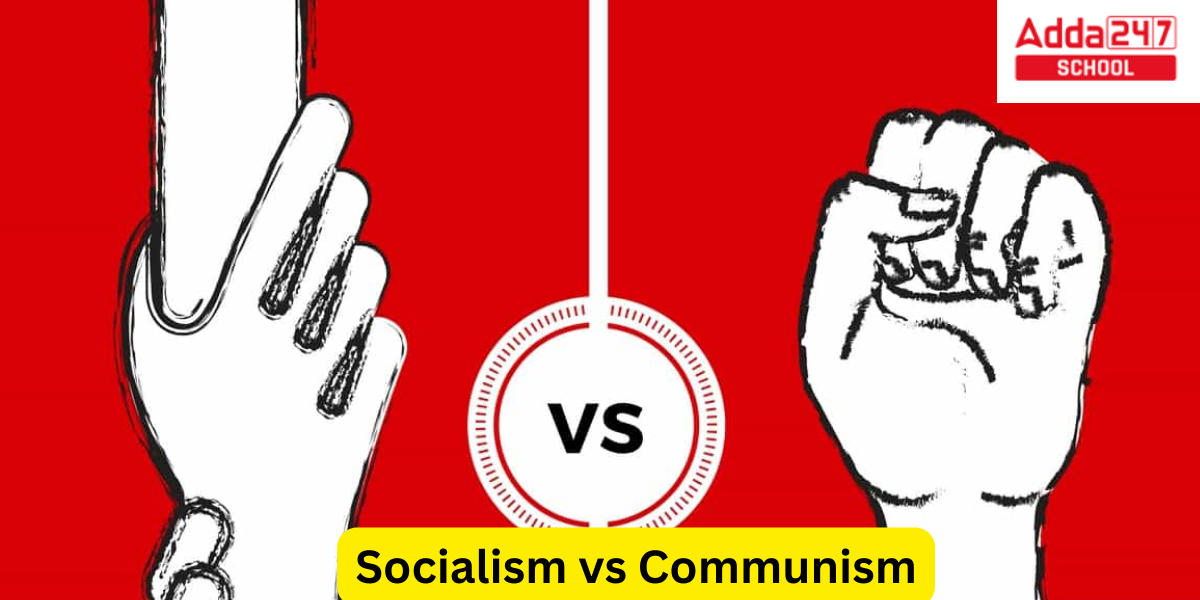Socialism vs Communism
Socialism and communism are not easily distinguishable from one another. Although the phrases are sometimes used interchangeably, these political and economic views are different. Both socialism and communism were born out of protests against the Industrial Revolution’s exploitation of the working class.
Some contemporary nations that are all philosophically opposed to capitalism are viewed as either communist or socialist, despite the fact that the applications of their economic and social policies vary. Understanding the parallels and distinctions between communism and socialism is crucial for comprehending current political issues.
Are Socialism and Communism different?
Under communism, the state (rather than individual citizens) owns and controls the majority of property and economic resources; under socialism, all citizens equally partake in the economic resources distributed by a democratically elected government.
Notwithstanding their fundamental differences from one another, socialism and communism are frequently substituted for one another. Although they have the this in common, Throughout the Industrial Revolution, communism and socialism emerged as a means of protest against the exploitation of the working class.
What is Communism?
A system of economic, political, and social organisation in which the majority or all assets are collectively owned by a classless society as opposed to by individual people is known as pure communism. Karl Marx, a German philosopher, economist, and political theorist, proposed the idea that pure communism produces a society in which everyone is treated equally and there is no need for money or the growth of personal wealth. Economic resources are not privately owned, and the entire manufacturing process is under the supervision of the central government. The distribution of economic output takes into account the requirements of the populace. Eliminating social tension between white-collar and blue-collar workers as well as between rural and urban cultures will allow each person to realise their fullest potential.
Under perfect communism, the central authority meets all of the people’s fundamental needs, including food, shelter, education, and healthcare, enabling everyone to benefit equally from the fruits of group effort. Free availability to essential necessities depends on ongoing technological developments driving up production levels.
What is Socialism?
Pure socialism is an economic system in which each person receives an equal portion of the four components of economic production—labor, enterprise, capital goods, and natural resources—through a democratically elected government. In essence, socialism is predicated on the idea that all people naturally desire cooperation but are prevented from doing so by capitalism’s competitive character.
In a socialist society, everyone has an equal ownership stake in the means of production. With a democratically chosen government, ownership is obtained. It might also take the form of a public corporation or cooperative in which everyone holds shares. The socialist government uses centralised planning, much like in a command economy, to distribute resources according to both the requirements of the individual and the needs of society as a whole. The distribution of economic production takes into account each person’s aptitude and level of participation.
Socialism vs Communism: Overview
In both communism and socialism, the means of production are owned by the populace. The main distinction between communism and socialism is that under communism, the state (rather than private citizens) owns and controls the majority of property and economic resources, whereas under socialism, all citizens share equally in the economic resources distributed by a democratically elected government.
Socialism vs Communism: Key Difference
According to their necessities, people are compensated or cared for under communism. Based on what it deems to be the requirements of the populace, the government in a pure communist society supplies the majority or all of the food, clothes, shelter, and other necessities. Socialism is predicated on the idea that people will be paid according to how much they individually contribute to the economy. Socialism thus rewards effort and invention.
Socialism vs Communism: Comparision
Let us check compare Socialism and Communism based on different attributes:
Socialism vs Communism: Philosophy
In a communist society, everyone contributes according to their means and needs; whereas, Socialism is the idea that everyone benefits according to their abilities and contributions.
Socialism vs Communism: Economy
In both Communism and Socialism, the economies are planned and implemented by the Government.
Socialism vs Communism: Ownership
In a communist system, the government owns and controls all economic resources. People do not possess any assets or personal property; whereas, People in Socialism are free to possess their own personal property, but the whole industrial and production capacity is collectively owned and run by a democratically elected government.
Socialism vs Communism: Distribution of Production
In Communism, All basic human requirements are meant to be satisfied by the production, which is provided free of charge to the populace; whereas, In Socialism, Production is dispersed in accordance with each person’s contribution and aptitude in order to meet both individual and community demands.
Socialism vs Communism: Class Difference
In Communism, There is no longer a concept of class. Earning more than other workers is hardly ever an option; whereas, In Socialism, Classes still exist, but the differences are lessened. There is a chance that some people will make more money than others.
Socialism vs Communism: Religion
In Communism, Religion has been essentially eliminated from society; whereas, In Socialism, Religion can be freely practised.
Socialism vs Communism: Similarities
Both communism and socialism emerged from grassroots opposition to the Industrial Revolution’s worker exploitation by powerful corporations. Both presuppose that government-controlled institutions or collective groups, rather than privately-owned firms, will generate all products and services. Furthermore, supply and demand issues as well as all other areas of economic planning fall primarily under the purview of the central government.









 GSEB HSC Science Supply Result 2025 Down...
GSEB HSC Science Supply Result 2025 Down...
 DTE Maharashtra Polytechnic Merit List 2...
DTE Maharashtra Polytechnic Merit List 2...
 JEECUP Round 2 Seat Allotment Result 202...
JEECUP Round 2 Seat Allotment Result 202...









